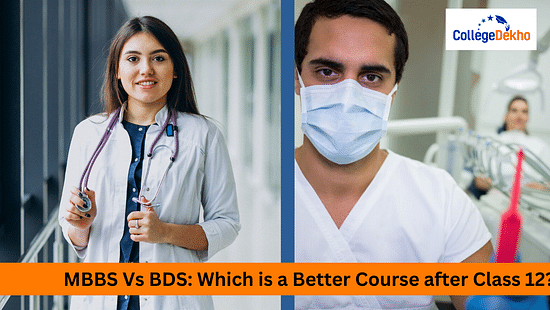MBBS is a 5.5 year course whereas BDS is a 5 year course and enroll in either of the two, student must qualify NEET UG 2024 exam. This article on MBBS vs BDS will assist aspirants in choosing the right course based on thier annual fee, salary packages and more.
- MBBS Vs BDS: Comparative Analysis
- MBBS Vs BDS: What is the Difference Between MBBS and …
- MBBS Vs BDS: Eligibility Criteria
- MBBS vs BDS: Admission Process
- MBBS Vs BDS: Fees Structure
- MBBS Course Syllabus
- Specializations after MBBS
- MBBS Career Scope
- Benefits of Pursuing MBBS
- Top MBBS Colleges in India: NIRF Ranking
- BDS Course Syllabus
- Specialisations after BDS
- BDS Career Scope
- Benefits of Pursuing BDS
- Top BDS Colleges in India: NIRF Ranking
- BDS Vs MBBS: Conclusion
- Faqs

MBBS vs BDS: The Bachelor of Medicine, Bachelor of Surgery (MBBS) and Bachelor of Dental Surgery (BDS) are India’s most opted Medical Courses for students with PCB in Class 12. Students can get admission into these courses only through scores obtained in NEET UG 2024 exam. There are no other entrance exams conducted for enrollment into these courses.
BDS Course
have shorter duration, lesser fees and high chances of admission to top colleges. On the other hand,
MBBS Course
can benefit from having a highly rewarding career, as doctors' average salaries are higher than those of dentists. However, If are still wondering which course to choose among MBBS vs BDS, understand your passion first, then go through the difference between MBBS and BDS to choose the right Medical course.
MBBS Vs BDS: Comparative Analysis
MBBS and BDS courses are popular choices by students who have passed class 12 with Physics, Chemistry and Biology as core subjects. Are you contemplating which course is better for you? Check out the table below to get a brief comparative analysis between MBBS and BDS courses.
Parameter | MBBS | BDS |
|---|---|---|
Duration of Course | 5.5 years (including 1-year internship) | 5 years ( including 1-year internship) |
Degree | Bachelor of Medicine Bachelor of Surgery MBBS | Bachelor of Dental Surgery BDS |
Examination to undertake | NEET-UG | NEET-UG |
Eligibility |
|
|
Fees Structure | Government colleges: INR 11,000 to 7.5 lakh Private colleges: INR 20 lakh to 80 lakh | Average tuition fees: INR 50,000 to INR 12 lakh |
Career Option |
|
|
MBBS Vs BDS: What is the Difference Between MBBS and BDS?
To solve the query of students related to BDS vs MBBS, they must first understand the basic difference between MBBS and BDS course. Both the courses target different aspects of medicine and mentioned below are the differences between MBBS and BDS.
- Focuses of the Course : MBBS teaches a specialization focused on the complete human body. In contrast, BDS is a specialization that focuses more on the neck and head regions of the human body.
- Duration and Internship : MBBS involves learning anatomy, physiology, conservative measures, surgical management, biochemical reactions, and more. BDS involves oral surgery, oral pathology, oral medicine, oral radiology, dental anatomy, etc. BDS is a +1 year mandatory internship and four years of academic education. At the same time, MBBS is a four and half-year course.
- Flexibility of Pursuing either of the Courses : Once you complete your course, you must take hands-on training in hospital wards and outpatient departments. On the other hand, you can pursue the BDS course either part-time or full-time.
MBBS Vs BDS: Eligibility Criteria
Given below are the eligibility criteria for MBBS and BDS courses. Know which course is more suitable for you by checking out its eligibility criteria.
Eligibility Criteria for MBBS
Applicants are required to fulfil specific eligibility criteria to be eligible for enrollment in the MBBS program. The outlined criteria are as follows:
Educational Qualification: The candidate must have completed the 12th grade from a recognized board.
Mandatory Subjects: In Class 12th, the applicant should have studied Biology, Physics, and Chemistry as mandatory subjects.
Minimum Percentage in PCM: The student is required to have secured a minimum of 50% in the aggregate of Physics, Chemistry, and Mathematics (PCM).
Minimum Age Requirement: The candidate should be at least 17 years old at the time of application.
Eligibility Criteria for BDS
Aspiring students seeking admission to the BDS program must satisfy the following eligibility criteria:
- Educational Qualification: Successful completion of a senior secondary examination from a recognized board.
- Mandatory Subjects: Inclusion of Physics, Chemistry, and Biology as mandatory subjects in the Class 12th curriculum.
- Minimum Percentage in PCM: Attainment of a minimum score of 50% in Physics, Chemistry, and Biology (PCM) in the Class 12th examination.
- Minimum Age Requirement: The candidate should be at least 17 years old to be eligible for admission.
MBBS vs BDS: Admission Process
For MBBS and BDS courses, students must appear in the NEET UG 2024 Exam , as it is the single UG medical entrance exam in India conducted for admission into MBBS, BDS, Nursing, AYUSH, and other courses. Students must pass class 12 with a minimum of 50% aggregate scores for Unreserved category students, and 40% for reserved category students.Students appear in NEET to enroll in any medical course, and during NEET Counselling 2024 , they will get an opportunity to choose between MBBS, BDS, or any other medical courses. Based on the registration and choice-filling process conducted by MCC at mcc.nic.in, students get their admission in the MBBS or BDS course they have chosen.
MBBS Vs BDS: Fees Structure
The MBBS fee structure varies for the government, private and deemed universities. The average fees for government colleges in India range from INR 11,000 to INR 7,00,00 for the complete course. The fees for private colleges can range between INR 20,00,000 lakhs to INR 80,00,000. Whereas, fees structure for BDS varies for government colleges, private colleges, and deemed universities. The average fees for BDS in India range from INR 50,000 to INR 12,00,000 for the complete course.
MBBS Course Syllabus
The MBBS course has a vast syllabus that covers every aspect of modern medical therapy. The course syllabus is divided in three major parts namely Pre-Clinical, Para-Clinical, and Clinical phase. The Syllabus of MBBS course is mentioned below -
Pre-Clinical Phase
Anatomy
Biochemistry
Physiology
Para - Clinical Phase
Forensic Medicine and toxicology
Microbiology
Pathology
Pharmacology
Clinical Phase
Anesthesiology
Community Medicine
Dermatology and Venereology
Medicine
Obstetrics and Gynecology
Ophthalmology
Orthopedics
Paediatrics
Psychiatry
Surgery
Specializations after MBBS
After successfully completing their MBBS, students have the option to pursue higher education in medicine by undertaking MD (Doctor of Medicine) or MS (Master of Surgery) programs, or they can opt for a postgraduate diploma, which allows them to specialize in specific fields. MD and MS degrees typically have a duration of three years, while postgraduate diploma programs usually take two years to complete.
Various specializations are available for students pursuing advanced medical degrees after MBBS. These specializations include but are not limited to:
- Anatomy
- Dermatology & Venereology
- Biochemistry
- Internal Medicine
- Orthopaedics
- Paediatrics
- Psychiatry
- Surgery
- Anaesthesiology
- Pathology
- Microbiology
- Physiology
These are just a few examples, and there are many more specializations to cater to diverse medical interests and career paths. Pursuing these advanced degrees allows medical professionals to become specialists in their chosen fields, contributing to the depth and expertise within the medical profession.
MBBS Career Scope
There are various job opportunities for students after the completion of the MBBS course. Students can join any private or government hospitals after the completion of course. Candidate can opt for any postgraduate studies after the completion of MBBS. Postgraduate studies help the candidate to specialise in a particular field of study. Students can either go for MS or MD after MBBS. Various specialisations include the following
- Pediatrics
- Psychiatry
- Gynaecology
- Orthopaedics
- Endocrinology
- Ophthalmology
- Internal medicine
- Plastic surgery, etc.
Benefits of Pursuing MBBS
The MBBS (Bachelor of Medicine, Bachelor of Surgery) program in India holds a distinguished position and offers a multitude of advantages that set it apart from other academic pursuits. Below is an extensive exploration of its importance:
Esteemed Reputation: The MBBS program enjoys a prestigious standing in India, commanding respect and admiration from students, parents, and the wider community.
Career Advancement and Opportunities: The medical field offers a vast landscape for professional growth, offering a wide array of exciting career opportunities. Medical practitioners have the option to specialize in various areas such as surgery, pediatrics, or cardiology, ensuring continuous avenues for progression.
A Noble and Gratifying Calling: The medical profession is often considered one of the noblest vocations. Physicians shoulder the profound responsibility of saving lives and actively contributing to the enhancement of the quality of life for numerous patients. The sense of fulfillment derived from aiding others is immeasurable.
Financial Prosperity: In addition to the inherent nobility of the profession, the medical field also presents substantial financial prospects. Experienced and specialized medical professionals can attain lucrative salaries, reflecting their dedication and the years invested in honing their expertise.
Top MBBS Colleges in India: NIRF Ranking
Candidates can explore the top dental colleges in India according to the NIRF ranking. This ranking helps us know which colleges excel in dental education and are recognized in the industry. Check out this list of private and government medical colleges to complete MBBS in India:
| Rank | Name | State | Score |
|---|---|---|---|
| 1 | All India Institute of Medical Sciences, Delhi | Delhi | 91.6 |
| 2 | Post Graduate Institute of Medical Education and Research | Chandigarh | 79 |
| 3 | Christian Medical College | Tamil Nadu | 72.84 |
| 4 | National Institute of Mental Health & Neuro Sciences, Bangalore | Karnataka | 71.56 |
| 5 | Banaras Hindu University | Uttar Pradesh | 68.12 |
| 6 | Jawaharlal Institute of Post Graduate Medical Education & Research | Pondicherry | 67.64 |
| 7 | Sanjay Gandhi Postgraduate Institute of Medical Sciences | Uttar Pradesh | 67.18 |
| 8 | Amrita Vishwa Vidyapeetham | Tamil Nadu | 66.49 |
| 9 | Sree Chitra Tirunal Institute for Medical Sciences and Technology, Thiruvananthapuram | Kerala | 65.17 |
| 10 | Kasturba Medical College, Manipal | Karnataka | 63.89 |
| 11 | King George`s Medical University | Uttar Pradesh | 61.68 |
| 12 | Madras Medical College & Government General Hospital, Chennai | Tamil Nadu | 60.71 |
| 13 | Institute of Liver and Biliary Sciences | Delhi | 58.79 |
| 14 | St. John's Medical College | Karnataka | 58.49 |
| 15 | Sri Ramachandra Institute of Higher Education and Research | Tamil Nadu | 57.92 |
| 16 | All India Institute of Medical Sciences Jodhpur | Rajasthan | 57.47 |
| 17 | Dr. D. Y. Patil Vidyapeeth | Maharashtra | 57.41 |
| 18 | Siksha 'O' Anusandhan | Odisha | 57.21 |
| 19 | Vardhman Mahavir Medical College & Safdarjung Hospital | Delhi | 57.15 |
| 20 | S.R.M. Institute of Science and Technology | Tamil Nadu | 57.05 |
| 21 | Institute of Post Graduate Medical Education & Research | West Bengal | 57.02 |
| 22 | Aligarh Muslim University | Uttar Pradesh | 56.19 |
| 23 | Maulana Azad Medical College | Delhi | 55.94 |
| 24 | Datta Meghe Institute of Medical Sciences | Maharashtra | 55.21 |
| 25 | Saveetha Institute of Medical and Technical Sciences | Tamil Nadu | 54.73 |
| 26 | All India Institute of Medical Sciences Bhubaneswar | Odisha | 54.71 |
| 27 | Govt. Medical College & Hospital | Chandigarh | 54.02 |
| 28 | University College of Medical Sciences | Delhi | 53.62 |
| 29 | Lady Hardinge Medical College | Delhi | 53.44 |
| 30 | Kalinga Institute of Industrial Technology | Odisha | 53.05 |
| 31 | Kasturba Medical College, Mangalore | Karnataka | 52.83 |
| 32 | Maharishi Markandeshwar | Haryana | 52.81 |
| 33 | Jamia Hamdard | Delhi | 52.51 |
| 34 | JSS Medical College, Mysore | Karnataka | 52.47 |
| 35 | PSG Institute of Medical Sciences & Research, Coimbatore | Tamil Nadu | 52.44 |
| 36 | Christian Medical College, Ludhiana | Punjab | 51.89 |
| 37 | Gujarat Cancer & Research Institute | Gujarat | 50.87 |
| 38 | M. S. Ramaiah Medical College | Karnataka | 50.7 |
| 39 | Chettinad Academy of Research and Education | Tamil Nadu | 50.35 |
| 40 | Dayanand Medical College | Punjab | 50.32 |
| 41 | Sawai Man Singh Medical College | Rajasthan | 49.93 |
| 42 | Krishna Institute of Medical Sciences Deemed University, Karad | Maharashtra | 49.76 |
| 43 | Medical College | West Bengal | 49.73 |
| 44 | SCB Medical College and Hospital | Odisha | 49.02 |
| 45 | Padmashree Dr. D. Y. Patil Vidyapeeth, Mumbai | Maharashtra | 48.59 |
| 46 | Regional Institute of Medical Sciences | Manipur | 48.21 |
| 47 | Mahatma Gandhi Medical College and Research Institute | Pondicherry | 48.05 |
| 48 | All India Institute of Medical Sciences, Rishikesh | Uttarakhand | 47.98 |
| 49 | All India Institute of Medical Sciences, Raipur | Chhattisgarh | 47.44 |
| 50 | B. J. Medical College | Gujarat | 46.53 |
Also Read: MBBS in India Versus MBBS Abroad
BDS Course Syllabus
The BDS course syllabus includes all aspects of Dental sciences and surgery. BDS is a 4 year course and the dental aspirants can refer for the syllabus mentioned below -
BDS First Year Syllabus
Human Anatomy including Embryology and Histology
Human Physiology and Biochemistry, Nutrition and Dietetics
Dental Anatomy Embryology and Oral Histology
Dental Materials
Pre-clinical Prosthodontics and Crown & Bridge
BDS Second Year Syllabus
General Pathology and Microbiology
Dental Pharmacology and Therapeutics
Dental Materials
Preclinical Conservative Dentistry
Pre-clinical Prosthodontics and Crown & Bridge
Oral Pathology & Oral Microbiology
BDS Third Year Syllabus
General Medicine
General Surgery
Oral Pathology and Oral Microbiology
Conservative dentistry and Endodontics
Oral & Maxillofacial Surgery
Oral Medicine and Radiology
Orthodontics & Dentofacial Orthopaedics
Paediatric & Preventive Dentistry
Periodontology
Prosthodontics and Crown & Bridge
BDS Fourth Year Syllabus
Orthodontics & Dentofacial Orthopaedics
Oral Medicine & Radiology
Paediatric & Preventive Dentistry
Periodontology
Oral & Maxillofacial Surgery
Prosthodontics and Crown & Bridge
Conservative Dentistry and Endodontics
Public Health Dentistry
Specialisations after BDS
After completing the degree, students with a BDS title can choose to go for higher education in dental science. There are many options to choose from, depending on the students' interest, expertise and career path as a dentist. A PG degree in dental science offers more scope in various fields depending on the specialization chosen. MDS or Master of Dental Science is a 3-year program that mainly focuses on advanced dental sciences and oral surgical techniques. The MDS course trains the students to become dental specialists and practitioners or consultants in their field of Dental Science. The doctors studying MDS can specialize in
Prosthodontics
Orthodontics
Operative Dentistry
Oral and Maxillofacial surgery
Conservative Dentistry
Periodontics
Oral Medicine and Radiology, etc.
BDS Career Scope
Upon successful completion of the 5-year BDS program, students find a plethora of opportunities in various avenues. Reputed medical colleges often facilitate placement opportunities for graduates in both private and government hospitals. While job prospects are available at this stage, pursuing a Master's in Dental Surgery (MDS) unlocks even more promising career pathways.
MDS, a postgraduate course, becomes an option after obtaining a BDS degree. Students can choose to pursue higher education in esteemed institutions, either within India or abroad, thereby enhancing their expertise in specific dental specialties.
Furthermore, with accumulated experience and practice, individuals have the option to establish their own dental clinic. This entrepreneurial avenue allows practitioners to build their careers independently and contribute to oral healthcare. The diverse array of opportunities post-BDS reflects the dynamic and rewarding nature of a career in dentistry.
Benefits of Pursuing BDS
Being a pocket friendly medical course and the guarantee of a stable income are some obvious benefits of pursuing a BDS course after completing class 12. The field offers plenty of opportunities in the public as well as in the private sector. Here are some major advantages of studying BDS.
- Financial Accessibility : Compared to the MBBS course, the BDS course often comes with lower annual course fees, which makes it accessible to Indian students from diverse socio-economic backgrounds.
- Streamlined Course Duration : While the MBBS course duration is of 5.5 years, the BDS program can be completed in 5 years.
- More Accessible Opportunities : When securing a seat in a medical course, the competition can be intense. However, the BDS program offers a greater chance of obtaining a seat under merit due to its lower competition compared to MBBS.
- Specialized Qualification : Pursuing BDS course gives specialized knowledge and skills in the field of dentistry. Unlike MBBS, which qualifies you for general medicine, BDS allows you to specialize in dental practice right from the undergraduate level.
- Simplified Admission Process : Securing admission into a BDS course is comparatively easier than getting into an MBBS program.
- Immediate Job Opportunities: A career after pursuing a BDS course opens doors to a high profit potential. Dentists can start earning soon after completing their BDS degree, allowing for faster financial stability.
Top BDS Colleges in India: NIRF Ranking
Explore the leading dental education institutions in India as per the National Institutional Ranking Framework (NIRF), offering valuable insights into academic excellence and industry recognition. Here is the list of private and government medical colleges to study BDS in India:
Name | City | State | Score | NIRF Rank |
|---|---|---|---|---|
Saveetha Institute of Medical and Technical Sciences | Chennai | Tamil Nadu | 84.08 | 1 |
Manipal College of Dental Sciences, Manipal | Manipal | Karnataka | 77.51 | 2 |
Dr. D. Y. Patil Vidyapeeth | Pune | Maharashtra | 73.08 | 3 |
Maulana Azad Institute of Dental Sciences | Delhi | Delhi | 70.96 | 4 |
A.B.Shetty Memorial Institute of Dental Sciences | Mangaluru | Karnataka | 69.21 | 5 |
SRM Dental College | Chennai | Tamil Nadu | 67.02 | 6 |
Sri Ramachandra Institute of Higher Education and Research | Chennai | Tamil Nadu | 63.96 | 7 |
Manipal College of Dental Sciences, Mangalore | Mangalore | Karnataka | 62.44 | 8 |
Siksha `O` Anusandhan | Bhubaneswar | Odisha | 61.56 | 9 |
Jamia Millia Islamia,New Delhi | New Delhi | Delhi | 61.14 | 10 |
JSS Dental College and Hospital | Mysuru | Karnataka | 60.06 | 11 |
Amrita Vishwa Vidyapeetham | Coimbatore | Tamil Nadu | 59.82 | 12 |
Postgraduate Institute of Dental Sciences | Rohtak | Haryana | 59.66 | 13 |
M.S. Ramaiah University of Applied Sciences | Bangalore | Karnataka | 58.99 | 14 |
Govt. Dental College, Nagpur | Nagpur | Maharashtra | 58.87 | 15 |
Meenakshi Academy of Higher Education and Research | Chennai | Tamil Nadu | 58.31 | 16 |
Datta Meghe Institute of Higher Education and Research | Wardha | Maharashtra | 57.63 | 17 |
Banaras Hindu University | Varanasi | Uttar Pradesh | 56.05 | 18 |
Nair Hospital Dental College | Mumbai | Maharashtra | 55.7 | 19 |
Kalinga Institute of Industrial Technology | Bhubaneswar | Odisha | 55.68 | 20 |
Government Dental College | Ahmedabad | Gujarat | 55.62 | 21 |
SDM College of Dental Sciences & Hospital | Dharwad | Karnataka | 55.29 | 22 |
M. G. R. Educational and Research Institute | Chennai | Tamil Nadu | 55.15 | 23 |
Government Dental College, Bangalore | Bangalore | Karnataka | 54.94 | 24 |
Government Dental College | Thiruvananthapuram | Kerala | 54.49 | 25 |
Vishnu Dental College, Bheemavaram | Bhimavaram | Andhra Pradesh | 54.41 | 26 |
Chettinad Dental College and Research Institute | Kelambakkam | Tamil Nadu | 53.9 | 27 |
Yenepoya Dental College | Mangaluru | Karnataka | 53.77 | 28 |
Govt. Dental College, Mumbai | Mumbai | Maharashtra | 53.09 | 29 |
Christian Dental College | Ludhiana | Punjab | 52.84 | 30 |
Aliigarh Muslim University | Aligarh | Uttar Pradesh | 52.83 | 31 |
Govt. Dental College, Indore | Indore | Madhya Pradesh | 51.63 | 32 |
Army College of Dental Sciences | Secunderabad | Telangana | 51.53 | 33 |
Panjab University | Chandigarh | Chandigarh | 51.21 | 34 |
KLE Vishwanath Katti Institute of Dental Sciences | Belgaum | Karnataka | 50.62 | 35 |
Bapuji Dental College & Hospital | Davangere | Karnataka | 50.52 | 36 |
Karnavati University | Gandhinagar | Gujarat | 49.87 | 37 |
Padmashree Dr. D. Y. Patil Vidyapeeth, Mumbai | Mumbai | Maharashtra | 49.69 | 38 |
Bharati Vidyapeeth (Deemed to be University) Dental College and Hospital | Pune | Maharashtra | 49.48 | 39 |
Saraswati Dental College & Hospital | Lucknow | Uttar Pradesh | 49.32 | 40 |
Also Read: Alternative Courses in Medical Field
BDS Vs MBBS: Conclusion
In conclusion, the decision between pursuing MBBS or BDS should be driven by individual passion and understanding of the differences between the two courses. Students must note that BDS course is a good option as it's annual course is less and chances of admission is high. On the other hand, MBBS course can also be considered it is ensures high income and stability.While MBBS offers a comprehensive study of the entire human body with the potential for highly rewarding careers and specialization opportunities, BDS focuses on dental sciences and provides avenues for establishing dental clinics or pursuing further studies in dentistry. Ultimately, both paths offer fulfilling career opportunities, and making an informed decision is crucial as it shapes one's professional journey for years to come.
For more information difference between MBBS and BDS, stay tuned at CollegeDekho!


















Similar Articles
NEET Cutoff 2024 for Govt Colleges (15% AIQ) - General, SC, ST, OBC, EWS
List of Documents Required for NEET 2024 Counselling
NEET State-wise Rank List 2024 (Soon): Check State-wise Merit List
Gujarat NEET Merit List 2024: Dates, MBBS/BDS Rank List in PDF, Tie-Breaking Criteria
Kerala NEET Merit List 2024: Dates, How to Download MBBS/BDS Rank List PDF, Tie-Breaking Criteria
List of Medical Colleges for 300-400 Marks in NEET UG 2024